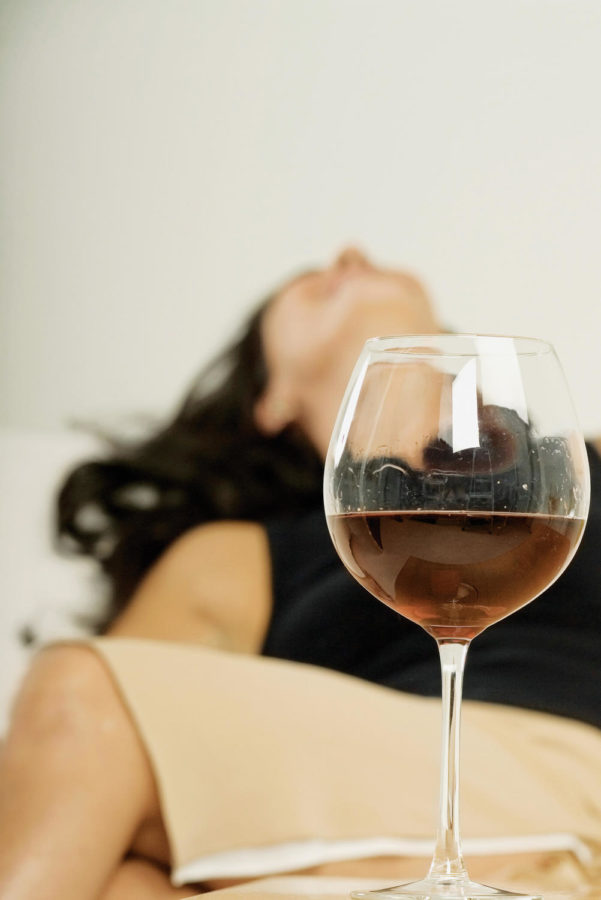Barefoot: No still means no, even under the influence
Close-up of a glass of wine in front of a young woman
April 5, 2011
It’s Sexual Assault Awareness Month, so this entire month you should be bombarded with the simple idea that “no means no and yes means yes.”
You should know by now, if someone says “no,” you do not have sex with them. If they cannot give consent because they are under the influence of drugs or alcohol, you can’t have sex with them.
The last part is the one I find interesting. It seems that no matter how many times someone hears it, some people don’t get it. Rape gets turned into partying too hard, a mistake that shouldn’t have happened. But not rape, because rape is a dirty, four letter word that people don’t want to be associated with.
Instead it becomes something else, and it becomes taken less seriously.
Take for example the movie, “Superbad,” that everyone seemed to find hilarious. While some parts are funny, overall, the film is rather sinister. The whole premise of the movie is that dorky Michael Cera and Jonah Hill attempt to buy some alcohol so that they can get a girl drunk enough so that she doesn’t know what she is doing and will sleep with one of them. That, my friends, is rape.
Not once does the movie acknowledge that it’s rape, and while their plan ends up failing, it doesn’t address the issue. Instead, the issue of taking advantage of someone when he or she is under the influence is portrayed as hilarious rather than serious.
Another example is the pilot episode of both the American and British versions of “Skins.” The entirety of the episode deals with Tony manipulating his friends for the purpose of helping Sid lose his virginity. How does Sid lose his virginity? He does it by tricking some girl to sleep with him through the use of drugs. Again, this is rape, and yet it is perceived to be comedy.
While these examples are just on a glowing screen, and we claim to be smart enough to know the difference from reality and fiction, examples such as the ones above impact our decision making; we know the issue is serious, but we take it as a big joke.
We use the term rape as a joke: we “raped” a math test, we get “raped” in a “Call of Duty” game. What’s the point of using language that exploits the horror and trauma a rape victim must deal with? Losing a video game and having sex against your will are on two entirely different levels.
Rape is also jokingly used on the site Texts From Last Night, in which people submit texts anonymously that deal with being under the influence in one way or another. These texts are perceived as funny, even when they deal with alcohol and sex. While you don’t get the full story in a text message, some of these messages give the vibe that alcohol is being used to have sex.
Here’s one example “510: I was gonna f*ck her but then she started eatin sushi from her purse. i really need to raise my standards” or “313: My overnight senior got drunk and hooked up with Kaylee on Sunday. I checked Facebook and he already put down his deposit for next year. This school should pay me a commission.”
Alcohol should not be used to make someone loose enough to have sex with you willingly. If someone needs to be under the influence to sleep with you, it is not truly consensual. It clearly falls under the rape category.
At least 80 percent of college students who had unwanted sex were under the influence of alcohol, according to a study by the University of Southern Illinois in 2003. That’s a high number for a society that knows that it’s still rape if someone is under the influence.
Already, rape is one of the most under-reported crimes, for various reasons. One big reason is that the victim often blames themselves for what happened: they were dressed “sexy,” they went into the room or they were drunk.
Regardless of the circumstances, it is not the victim’s fault; he or she didn’t make it happen, the rapist made it happen.
When we throw alcohol into the mix, people believe it’s their fault. They shouldn’t have been that drunk or should have known what was going on. Maybe we should look at how much the rapist was drinking, instead.
Numerous studies have shown a connection between rapists and alcohol. Forty percent of convicted rape and sexual assault offenders in state prison said they were drinking at the time of their crime, according to a study done in 2001.
Sex, alcohol, and bad decisions usually all work together, but we fail to see the serious problems. Rape is written off as mistake, sometimes even mixed in with a walk of shame. We laugh it off and say we shouldn’t have done it.
We need to see these events for what they are: simply rape. Alcohol is not a freebie pass to have sex. We know this, so let’s actually follow through.







